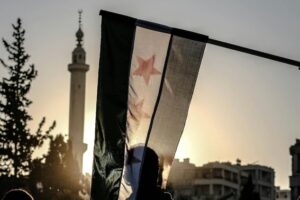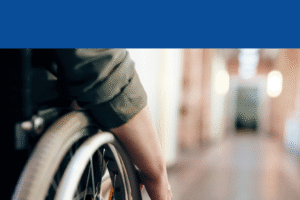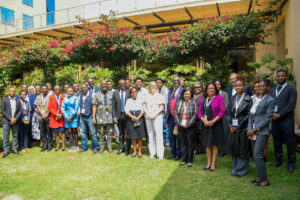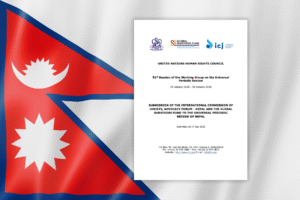
Oct 23, 2018 | Events, News
This side event will be held on October 25th, 2018, from 13:00 until 14:30 at Room XXVII, Palais des Nations, United Nations, in Geneva.
Organized jointly by the ICJ, the International Institute for Sustainable Development (IISD) and the Friedrich Ebert Stiftung (FES), this session’s goal is to provide a platform for discussion about the benefits and shortcomings of the current model of dispute settlement on investment matters and the needs and directions of future reform.
The debate will assist all participants in the World Investment Forum in understanding the current issues regarding investment dispute settlement and the needs and options for reform with a view to foster a strategy where investment-related dispute settlement and rule of law principles contribute to the sustainable development objectives.
The objectives of the event:
- Provide a platform for informed discussion among practitioners and interested stakeholders in the area of investment-related dispute settlement
- Contribute to an improved understanding of the issues at stake and the options for future reform
- Contribute to the efforts of the international community to achieve common ground in various issues related to investment-related dispute settlement
Issues for debate:
- What should governments expect from the ongoing UNCITRAL process in reforming investor-State dispute settlement (ISDS)?
- Should substantive and procedural issues relating to the current model of dispute settlement on investment matters be addressed in a comprehensive way?
- What are the elements to be considered when discussing the possible creation of an investment court?
- Would people impacted by investment projects have a role and standing in investment-related dispute settlement?
Speakers:
Vu Thi Chau Quynh, Deputy Director General, Department of Legislation, The Ministry of Planning and Investment, Viet Nam
Kekeletso Mashigo, Director, Legal – International Trade, Investment, Tax Trade Negotiations Unit, International Trade and Economic Development Division, Department of Trade and Industry, South Africa
Colin Brown, Deputy Head of Unit – Dispute Settlement and Legal Aspects of Trade Policy – DG TRADE – European Commission
Samira Sulejmanovic, Head, Unit for Bilateral Trade Relations, Ministry of Foreign Trade and Economic Relations, Bosnia and Herzegovina
Jane Kelsey, Professor, Faculty of Law, The University of Auckland, New Zealand
Moderator:
Sam Zarifi, Secretary-General of the ICJ.
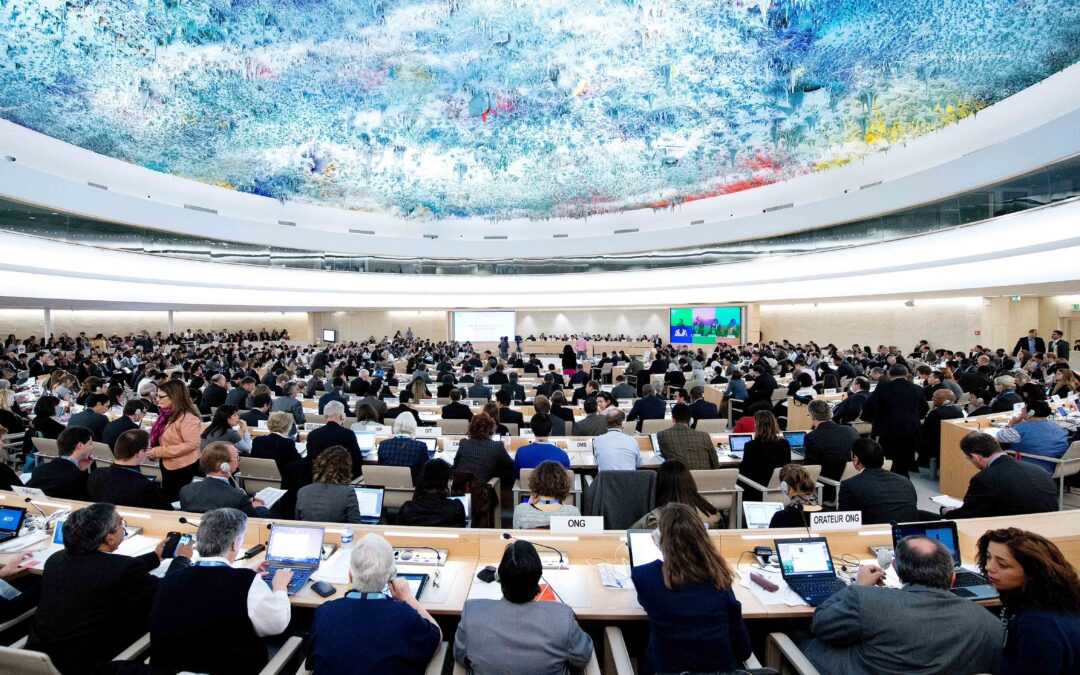
Oct 19, 2018 | Advocacy, Non-legal submissions
The International Commission of Jurists participated in the fourth session of the open-ended intergovernmental working group on transnational corporations and other business enterprises with respect to human rights that took place at the Palais de Nations from 15-18 October 2018. Below are the interventions the ICJ made at this session.
UN-ICJ statement IGWG4 general debate-Advocacy-ENG-2018
UN-ICJ statement IGWG4 prevention-Advocacy-ENG-2018
UN-ICJ statement IGWG4 legal liability-Advocacy-ENG-2018
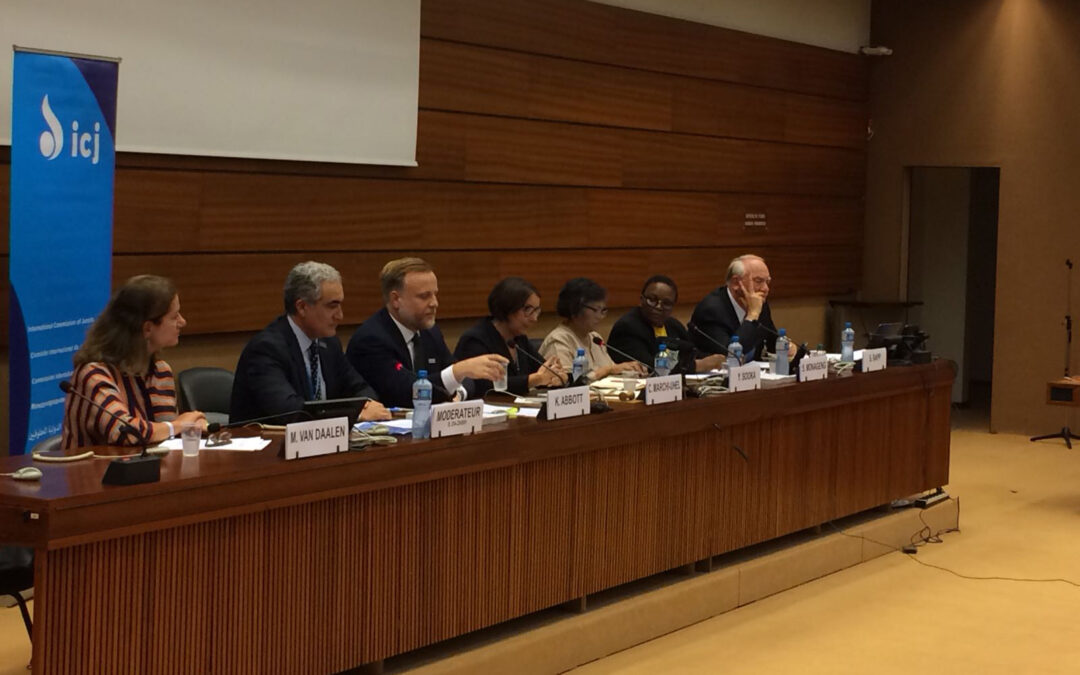
Sep 18, 2018 | Événements, Multimédia, Nouvelles
La CIJ a organisé cet événement parallèle aujourd’hui (mardi 18 septembre 2018) au Conseil des droits de l’Homme, en coopération avec la Mission permanente des Pays-Bas.
https://www.facebook.com/ridhglobal/videos/1005764152964172/
Contexte
En particulier lorsque des crimes de droit international sont perpétrés à grande échelle dans des situations de crise, il est urgent de préserver les preuves pouvant être utilisées lors de procédures pénales éventuelles, que ce soit devant la Cour pénale internationale ou d’autres tribunaux nationaux ou internationaux.
Trop fréquemment, des obstacles empêchent un recours direct aux tribunaux et procureurs internationaux. L’une des réponses a été la création de mécanismes pour collecter et conserver les preuves pendant ce temps. Les exemples incluent le Mécanisme international indépendant et impartial (IIIM) pour la Syrie et la Commission des droits de l’Homme au Sud Soudan.
À la présente session du Conseil des droits de l’Homme, la mission d’enquête sur le Myanmar a appelé à la création d’un IIIM dans l’attente d’une saisine de la CPI ou d’un tribunal ad hoc.
Discours d’ouverture
Ambassadeur Monique T.G. van Daalen, Mission permanente des Pays-Bas
Modérateur:
Saman Zia-Zarifi, Secrétaire général de la Commission internationale des juristes
Panélistes:
- Catherine Marchi-Uhel, cheffe du Mécanisme international indépendant et impartial (IIIM) pour la Syrie
- Yasmin Sooka, présidente de la Commission des droits de l’homme au Sud Soudan
- Sanji Monageng, ancienne juge / vice-présidente de la CPI et commissaire de la CIJ
- Stephen Rapp, président de la Commission pour la justice internationale et la responsabilité (CIJA), membre émérite du US Holocaust Memorial Museum, et ancien ambassadeur des États-Unis chargé pour la justice pénale mondiale
- Kingsley Abbott, conseiller juridique principal de la CIJ, anciennement aux Chambres Extraordinaires au sein des Tribunaux Cambodgiens et du Tribunal spécial pour le Liban
Universal-ICJ-NL-Side event-News-events-2018-ENG (prospectus de l’événement en PDF uniquement en anglais)
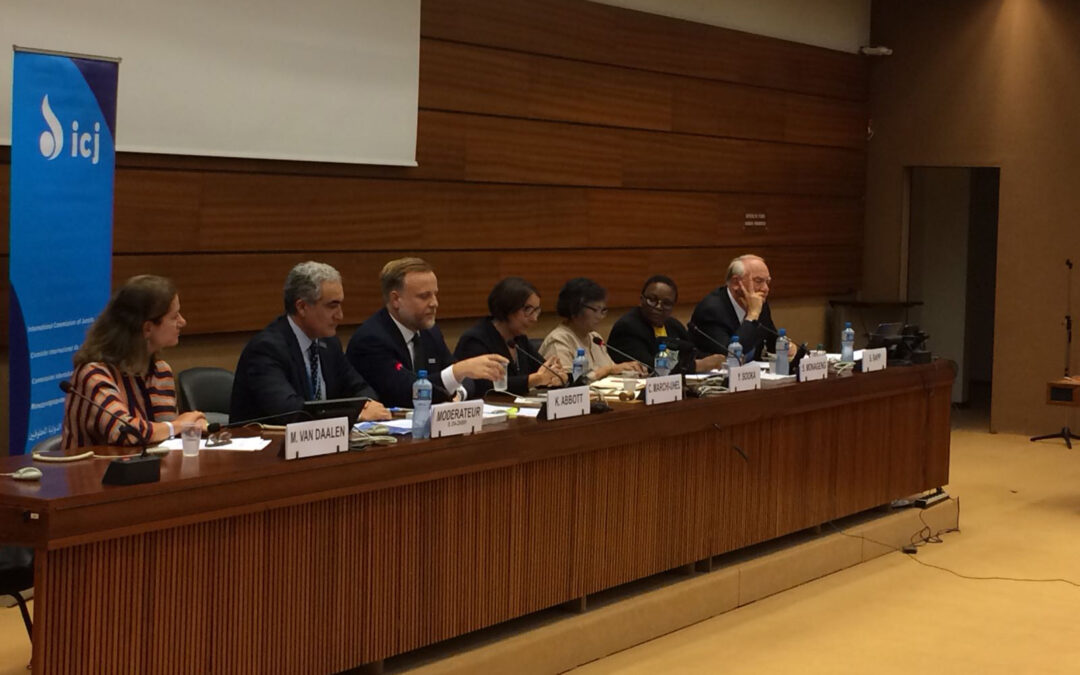
Sep 18, 2018 | Events, Multimedia items, News, Video clips
The ICJ organized this side event today (Tuesday 18 September 2018), in cooperation with the Permanent Mission of the Netherlands, at the Human Rights Council.
https://www.facebook.com/ridhglobal/videos/1005764152964172/
Background
Particularly when crimes under international law are perpetrated on a large scale in situations of crisis, there is an urgent need to preserve evidence for use in eventual criminal proceedings, whether at the International Criminal Court or other national or international tribunals
Too frequently, obstacles prevent immediate direct recourse to international courts and prosecutors. One response has been the creation of mechanisms to collect and preserve the evidence in the meantime. Examples include the International Independent and Impartial Mechanism (IIIM) for Syria, and the Commission on Human Rights in South Sudan.
At the current session of the Human Rights Council, the Fact-Finding Mission on Myanmar has called for establishment of an IIIM pending referral to the ICC or an ad hoc tribunal.
Opening Remarks:
Ambassador Monique T.G. van Daalen, Permanent Mission of the Netherlands
Moderator:
Saman Zia-Zarifi, Secretary General, International Commission of Jurists
Panelists:
- Catherine Marchi-Uhel, Head, International, Impartial and Independent Mechanism (IIIM) for Syria
- Yasmin Sooka, Chairperson, Commission on Human Rights in South Sudan
- Sanji Monageng, former Judge/Vice-President of the ICC, and Commissioner of the ICJ
- Stephen Rapp, Chair, Commission for International Justice & Accountability (CIJA), Distinguished Fellow, US Holocaust Memorial Museum, and former United States Ambassador-at-Large for Global Criminal Justice
- Kingsley Abbott, ICJ Senior Legal Adviser (Global Accountability), formerly with the Extraordinary Chambers in the Courts of Cambodia and the Special Tribunal for Lebanon
Universal-ICJ-NL-Side event-News-events-2018-ENG (flyer of the event in PDF)
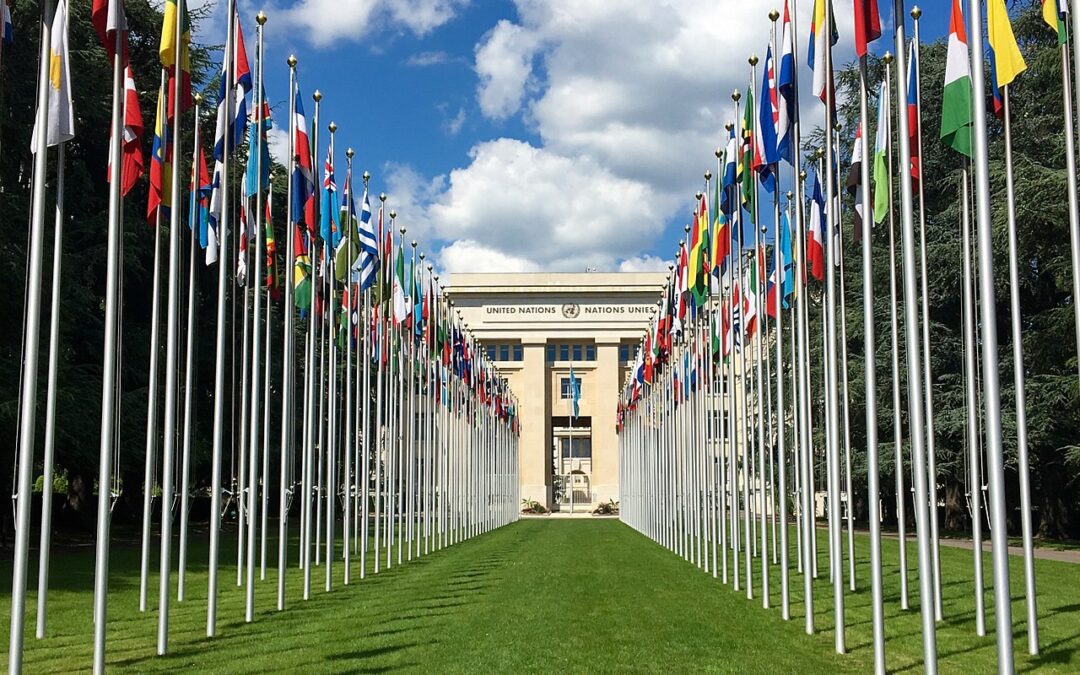
Sep 18, 2018
The ICJ today urged States not to vote for candidates whose human rights records should disqualify them from membership, in upcoming elections to the UN Human Rights Council.
The ICJ together with dozens of other NGOs made the call in an open letter to all UN member States:
“To Permanent Representatives of Member States of the UN General Assembly
18 September 2018
Member States of the UN should refrain from voting for candidates to the Human Rights Council that are unfit for membership
Excellencies,
Ahead of the next UN Human Rights Council (“HRC” or “the Council”) election, we, the undersigned national, regional and international civil society organisations, write to urge your delegation to refrain from voting for candidates that blatantly fail to fulfil the Council membership standards outlined in UN General Assembly (UNGA) resolution 60/251.
Paragraphs 8 and 9 of resolution 60/251 state that the UNGA:
- Decides that the membership in the Council shall be open to all States Members of the United Nations; when electing members of the Council, Member States shall take into account the contribution of candidates to the promotion and protection of human rights and their voluntary pledges and commitments made thereto […];
- Decides also that members elected to the Council shall uphold the highest standards in the promotion and protection of human rights [and] fully cooperate with the Council […].
We are concerned that several of the States that are running for election fail to fulfil minimal requirements with regard to both the promotion and protection of human rights and cooperation with the Council and other UN human rights bodies and mechanisms. Some of these candidates show a pattern of non-cooperation with the UN human rights system and attacks against UN Special Procedure Mandate-Holders that is incompatible with Council membership. Furthermore, some of this year’s candidates have engaged in acts of intimidation and reprisals against human rights defenders and civil society organizations, who play a key role in the Council’s work. Voting for these candidates would undermine the Council’s credibility and institutional integrity.
We urge you to treat human rights considerations and the substantive Council membership criteria outlined in resolution 60/251 as paramount in electing members to the Council, rather than engaging in vote trading or privileging political considerations over fundamental human rights.
In October 2018, the next HRC election will determine which States sit as Members of the Council in the next three years (2019-2021). Considering that States must receive a simple majority of votes (i.e., 97) to be elected, that voting takes place by secret ballot, and that electing States are under no obligation to vote for each and every candidate within a regional group, we urge your delegation to simply refrain from voting for unfit candidates. Doing so will require leaving the ballot blank for those candidate States your delegation considers unfit.
Sincerely,
African Centre for Democracy and Human Rights Studies (ACDHRS)
African Centre for Justice and Peace Studies (ACJPS)
Americans for Democracy & Human Rights in Bahrain (ADHRB)
ARTICLE 19
Asian Forum for Human Rights and Development (FORUM-ASIA)
Asian Legal Resource Centre (ALRC)
Bahrain Institute for Rights and Democracy (BIRD)
Cairo Institute for Human Rights Studies
Centro de Estudios Legales y Sociales (CELS)
CIVICUS: World Alliance for Citizen Participation
Commonwealth Human Rights Initiative (CHRI)
Conectas Direitos Humanos
Connection e.V., Germany
DefendDefenders (the East and Horn of Africa Human Rights Defenders Project)
EEPA
Eritrea Focus
Eritrean Diaspora in East Africa (EDEA)
Eritrean Law Society (ELS)
Eritrean Movement for Democracy and Human Rights (EMDHR)
Geneva for Human Rights (GHR)
Global Centre for the Responsibility to Protect
Global Initiative for Economic, Social and Cultural Rights
Horn of Africa Civil Society Forum
Human Rights Association / İnsan Hakları Derneği (İHD)
Human Rights Concern – Eritrea (HRCE)
Human Rights House Foundation
Human Rights Law Centre
Human Rights Watch
Information Forum for Eritrea (IFE)
International Commission of Jurists
International Federation of Action by Christians for the Abolition of Torture (FIACAT)
International Federation for Human Rights (FIDH)
International Humanist and Ethical Union (IHEU)
International Movement Against All Forms of Discrimination and Racism (IMADR)
International Service for Human Rights
Network of Eritrean Women
PEN Eritrea
Reporters Without Borders (RSF)
Southern Africa Human Rights Defenders Network (SAHRDN)
World Organisation Against Torture (OMCT)
Zimbabwe Lawyers for Human Rights (ZLHR)”






